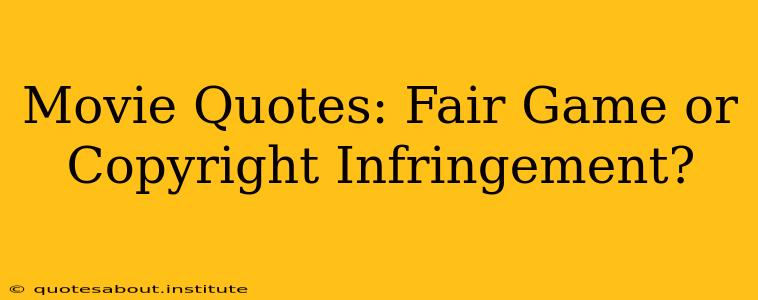Using movie quotes is commonplace – from casual conversations to marketing campaigns. But where's the line between harmless homage and copyright infringement? This guide explores the legal and ethical considerations surrounding the use of movie quotes. Understanding the nuances can save you from potential legal trouble and maintain ethical practices.
What is Copyright and How Does it Apply to Movie Quotes?
Copyright protects original works of authorship, including the script of a movie. This protection extends to the specific wording of dialogue, which means movie quotes are generally considered copyrighted material. This copyright belongs to the copyright holder, often the production company or screenwriter. Simply put, using copyrighted material without permission could lead to legal repercussions.
Is Using Movie Quotes Always Copyright Infringement?
Not always. The doctrine of "fair use" provides a crucial exception. Fair use allows limited use of copyrighted material without permission for purposes such as criticism, commentary, news reporting, teaching, scholarship, or research. However, fair use is not a blanket permission; it depends on a four-factor test:
-
The purpose and character of your use: Is it transformative (adding new meaning or message)? Is it commercial or non-commercial? Using a quote in a parody or critique is more likely to be considered fair use than using it for a commercial product.
-
The nature of the copyrighted work: Is it fictional or factual? Using quotes from a fictional work is more likely to fall under fair use restrictions than using quotes from a factual documentary.
-
The amount and substantiality of the portion used: Using a short, impactful quote is less likely to be considered infringement than using a large portion of the dialogue. Context is crucial.
-
The effect of the use upon the potential market for or value of the copyrighted work: Does your use harm the market for the original work? Would a movie studio lose revenue because of your use?
Example: Using a famous quote in a critical essay analyzing the film's themes would likely fall under fair use. However, using the same quote on a t-shirt for commercial sale is much less likely to qualify.
What About Short Quotes or Common Phrases?
Even short quotes can be subject to copyright. The length of the quote isn't the sole determining factor; its significance and context are vital. While commonly used phrases might not be copyrighted (e.g., "Frankly, my dear, I don't give a damn" might be less easily protected due to its fame), it’s best to err on the side of caution.
H2: What constitutes transformative use of a movie quote?
Transformative use means altering the quote's original meaning or context to create something new. A parody, for instance, uses a quote ironically or satirically, adding a new layer of meaning. A critical analysis might use quotes to support an argument, offering a new perspective on the original work. The key is to demonstrate that your use adds value beyond simply repeating the original.
H2: Are there any situations where using movie quotes is explicitly permitted?
Some movie studios might offer licensing options for specific uses of their copyrighted material. For commercial purposes, it's always best to contact the copyright holder directly to discuss licensing possibilities. Using quotes in educational settings, such as a classroom, often falls under fair use, particularly if the use is limited and clearly for educational purposes.
H2: What are the potential consequences of copyright infringement related to movie quotes?
The consequences of copyright infringement can be severe. Copyright holders can sue for damages, including profits made from the unauthorized use, legal fees, and potentially statutory damages. This can result in significant financial penalties. In extreme cases, it could also lead to injunctions preventing further use of the quote.
Conclusion
Navigating the world of movie quotes and copyright requires careful consideration. While fair use provides a degree of flexibility, understanding the four-factor test is crucial. When in doubt, it's always best to seek legal advice or obtain permission from the copyright holder. Respecting intellectual property rights safeguards both creativity and the legal well-being of those using copyrighted material. Remember, responsible use not only avoids legal complications but also builds respect within the creative community.

